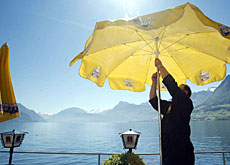
Worst-case scenarios are good for the climate

Climate scientists tell swissinfo why the Swiss should be worried by the melting of alpine glaciers, and defend the presentation of worst-case scenarios.
The comments from the two experts at Zurich University come as the second IPCC report on climate change, published on April 6, details the impact global warming will have on human populations.
The rapid melting of Switzerland’s glaciers over the past few years has been a powerful – and very visual – symbol of global warming. But recent reports show that the disappearing ice sheets could have a profound impact on the country.
Wilfried Haeberli is head of the university’s physical geography division and director of the World Glacier Monitoring Service. Lecturer Martin Hoelzle is president of the Swiss Snow, Ice and Permafrost Society (SIP), founded last year.
swissinfo: How will climate change alter the lives of people in Switzerland?
Wilfried Haeberli: I think one of the main changes will be the alteration of the landscape which will affect the way people identify with their country – and tourist attractions. And the influence of melting glaciers on the water cycle will be quite a serious problem. Switzerland is very rich in water, but even Switzerland can be affected during hot, dry summers.
Martin Hoelzle: Yes, the glaciers feed rivers and lakes with melt water and if the glaciers disappear you won’t have melt water in summer. And if there is a decrease in precipitation in summer as predicted, it will become even drier. This will have a significant impact on the water industry, and also of course power plants and agriculture.
swissinfo: By presenting worst-case scenarios, are scientists not just being scaremongers?
W.H.: Not at all. I think science is carefully reflecting on possible future evolutions and some of these evolutions are really difficult scenarios. But they are the elementary basis for developing effective protection measures so it’s really a question of survival if you think about what could happen in future. When we cross the road, we always have a worst-case scenario in mind.
swissinfo: Otherwise we would be hit by a car…
W.H.: Right. You have to be aware of what could happen in a worst-case scenario to get safely across. This is exactly what science does.
swissinfo: Despite the findings of climate scientists and the future scenarios they have presented, there are still a lot of unknowns. What direction should science be taking to better understand the processes of climate change?
W.H.: Science has a key role to play because it’s the only tool by which we can try to understand the reaction of very complex systems which are going far out of equilibrium. This is an incredibly difficult task. I would say we need a new science of disequilibria and complex systems. And this is different from the science of individual disciplines we have now. We have to put more emphasis on integrative scientific approaches.
swissinfo: Mr Hoelzle, is the SIP an indication of science heading in a new, integrative direction?
M.H.: One of the reasons we founded our society was to communicate our message to an interested public. Up to now, it was often the scientist speaking to the media but sometimes what appeared afterwards in the press was rather odd. I think we have to communicate our results more precisely to the public, so they and politicians have a better understanding of the results.
swissinfo-interview: Dale Bechtel

In compliance with the JTI standards
More: SWI swissinfo.ch certified by the Journalism Trust Initiative




























You can find an overview of ongoing debates with our journalists here . Please join us!
If you want to start a conversation about a topic raised in this article or want to report factual errors, email us at english@swissinfo.ch.